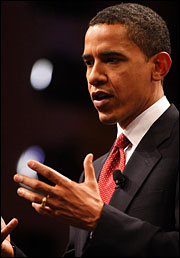The U.S. House of representatives is debating landmark climate and clean energy legislation now – starting with the debate on the rule which limits total debate on Waxman-Markey bill to 3 hours, which means we should get a final vote by the end of the day.
The Waxman-Markey bill would dramatically shift the direction of US energy policy and put the nation on a path to dramatically reduce greenhouse gas emissions in the coming decades, ultimately removing the overwhelming majority CO2 emissions from the nation’s economy by mid-century, while generating millions of clean energy jobs and restoring US leadership in the key industries of the future.

Over the next of several hours, you can watch this debate on C-SPAN (with various interruptions). But one can hardly find any discussion of this most consequential legislation in the status quo media. Even before the death of two pop icons, the coverage was very sparse.
Reuters worries “Michael Jackson overshadows Farrah Fawcett on a sad day.” That’s the extent of the media’s introspection on its priorities!
Consider the paper of record today, whose front page (here) pretty much tells the rest of the media what the big stories of the day are. We’ve got Michael Jackson on the cover. Even Farrah makes the bottom of the front page where the short version of key stories inside are listed. But no mention at all of the historic debate. Indeed, there is no news coverage of this at all in the NYT (or much of the major media).
Now the NYT does have an excellent editorial on the bill, which I will reprint below. But even there, the front page merely mentions that Paul Krugman has an op-ed. So you’ll have to watch C-SPAN – and the blogosphere – for the real news of the day. Here is the editorial, “The House and Global Warming“:
American politicians, from both parties, insist that they want to combat global warming and reduce this country’s dependence on fossil fuels. Members of the House will soon have a chance to show they mean it. Voters should watch carefully to see what they do.
The American Clean Energy and Security Act would, for the first time, put a price on carbon emissions. The bill has shortcomings. But we believe that it is an important beginning to the urgent task of averting the worst damage from climate change. Approval would show that the United States is ready to lead and would pressure other countries to follow. Rejection could mean more wasted years and more damage to the planet.
The outcome depends on perhaps 30 Democrats who fear higher energy costs for businesses and consumers, and a dozen or so Republican moderates who also worry about costs and who have been pressed by their leadership not to give President Obama a victory.
We urge all to examine several recent studies showing the costs of the legislation to be minimal. The non-partisan Congressional Budget Office projects average costs of $175 a year per American household by 2020 – vastly lower than the $3,000-plus figure bandied about by Republican leaders. We also urge them to read the scientific analysis forecasting the catastrophic costs to the planet, this country’s security and its economy if global warming is left unchecked.
The centerpiece of the legislation is a provision that aims to cut America’s production of greenhouse gases by 17 percent by 2020 and 83 percent by midcentury – the minimum reductions scientists say are necessary to avert the worst consequences of climate change.
Its mechanism for doing so is a cap-and-trade system that would place a steadily declining ceiling on emissions while allowing emitters to trade permits, or allowances, to give them flexibility in meeting their targets. The point is to raise the cost of older, dirtier fuels while steering investments to cleaner ones.
The two seasoned politicians behind this bill – Henry Waxman of California and Ed Markey of Massachusetts – have also insisted on provisions that would mandate more efficient buildings, require cleaner energy sources like wind power and provide subsidies for new technologies. They have tried hard to shield poor consumers from higher energy costs. The C.B.O. estimates that, with rebates, the bottom 20 percent would actually come out ahead.
They have bent over backwards – too far backwards, according to some critics – to ease the cost of compliance for polluters by giving them relatively inexpensive ways to satisfy their emissions quotas before they have to invest heavily in cleaner energy sources and new technologies.
The C.B.O. did not factor in the potential cost savings to consumers from other parts of the bill – the energy efficiency provisions, for instance. Nor was it asked to quantify the costs of doing nothing.
But we know the answer to that. By any measure – drought, famine, coastal devastation – the costs of inaction, of clinging to a broken energy policy, will dwarf the costs of acting now. It is this truth that the House must keep firmly in mind as it votes.
I agree with the NYT: “Voters should watch carefully to see what they do.” You just want be able to do that watching with any help from the status-quo media.



